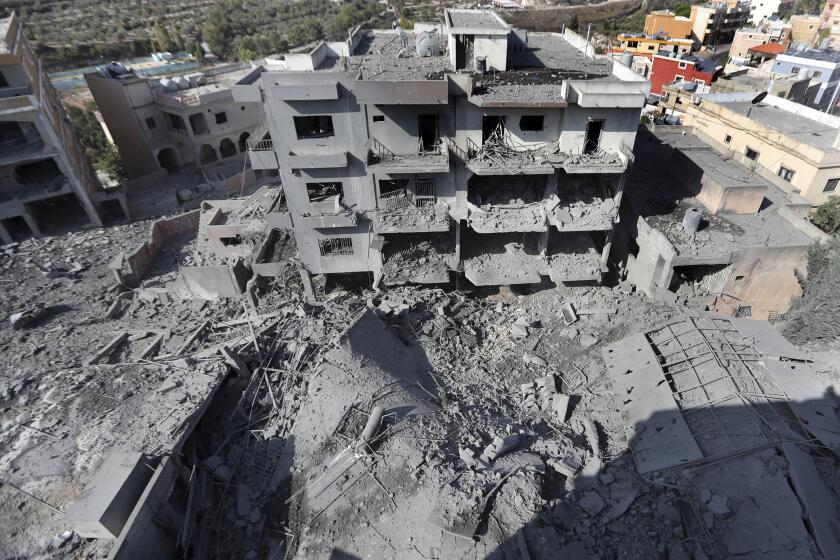Brazil--and Free Market--Put to Test
World economic leaders are nearing a consensus that Latin America, especially Brazil, must be saved from an Asian-style economic collapse. That consensus crystallized Monday as the world community, led by President Clinton, made the survival of emerging markets a priority.
The major industrialized nations seem ready to draw a line in the sand with Brazil out of fear that the collapse of Latin America’s largest economy would be an enormous setback in the global shift toward free-market economies. It could even threaten hard-won democratic reforms in Brazil.
At break-neck speed, Brazil--unlike most of the East Asia tigers and politically unstable Russia--has metamorphosed since 1993 from a closed, insular economy to a democratic, free-market society that has given rise to a booming middle class and become one of the most important trading markets in the world.
“There’s symbolic importance to Brazil,” said Paulo Levy, director of the Institute for Applied Economic Research in Rio de Janeiro. “You would be ashamed if after pursuing policies so strongly favored by the U.S. government, Brazil is left on its own in this situation of extreme financial instability.”
The crisis that began in Asia and spread to Russia is now upon Brazil’s shores as disenchantment with other emerging markets grows. Since Aug. 1, the world’s ninth-largest economy has spent $25 billion in foreign reserves to defend its currency, the real. But fears that the money will run out has made the possibility of a devaluation very real.
And if the United States stands by and does nothing, Brazil’s collapse could reflect a failure of U.S. power--and will--to promote a free-market doctrine.
“A failure could be understood as the failure of all such [free-market] models and reinforce tendencies back toward state-oriented economies,” said Edmar Bascha, chief economist at Bank BBA-Creditanstalt in New York.
A devaluation also would put at risk the significant U.S. investment in Brazil, which has totaled $25 billion in the last four years. And it would make Brazil a less attractive export market. U.S. companies last year sold $16 billion in goods and services to Brazil--the 11th-biggest U.S. export market.
Brazil is also the economic keystone of South America, representing 40% of the region’s $1.8-trillion output. If Brazil slides into a deep recession, which many see as the inevitable result of a devaluation, it would drag much of the region down with it, especially Argentina, whose economy is virtually symbiotic with Brazil’s.
The near-term impact of a devaluation would be crushing for Brazil because it could usher in another era of hyper-inflation and economic chaos that bedeviled the country for 25 years until 1994. That experience almost destroyed not just Brazil’s economy, but its social fabric as well.
“There’s a question of democracy,” Bascha said. “Brazil used to be very statist, under military regimes, and the opening up of the economy [has been] done under democratic regimes. So [a collapse] could weaken this belief in democratic institutions in the context of . . . dealing with economic problems.”
The irony is that economists insist Brazil is doing just about all it can to help its economy. Under President Fernando Henrique Cardoso’s “Real Plan,” named after the currency unit introduced in July 1994, Brazil has cut inflation from 2,500% in 1993 to less than 2% this year and has promoted slow but steady growth.
“There are no dominoes falling for the time being. Cardoso is holding out. He has been very determined up to now,” said Isaac Cohen, director of the Economic Commission for Latin America, a United Nations-sponsored research agency in Washington.
Brazil has been successful in reforming itself by cleansing its banking system of bad loans and raising billions by privatizing state-owned monopolies. Because of those efforts, it was much farther along than was Asia when economies there collapsed last year. And that has helped Brazil withstand the first winds of the Asian contagion--until now.
Cardoso still has some work left on his plan, namely reforming the bloated social security system and thinning the government payroll, which have helped produce a skyrocketing budget deficit that in turn made the currency vulnerable.
On Monday, however, Brazil’s stock market surged for the second straight session, gaining 7.8% on top of Friday’s 13% gain. Investors responded both to the rise in domestic interest rates imposed by Cardoso on Friday that should slow the capital flight for the time being, and gains in the U.S. stock market Monday.
Latin America’s financial markets were buoyed by Clinton’s remarks and by a statement from the Group of Seven industrialized nations that said a special $16.5-billion emergency fund would become available to boost emerging markets.
Although Clinton did not mention Brazil by name, many analysts took his comments to refer to the biggest and most endangered emerging market of all.
“We have to be ready to respond immediately, and with financial force, if necessary,” Clinton said in a speech to the Council on Foreign Relations in New York.
Brazil was also heartened by rumors Monday that the International Monetary Fund, the World Bank and the Inter-American Development Bank were in discussions to create a multibillion-dollar fund for Brazil if its situation deteriorated further, analysts said.
Foreign capital continued to pour out of Brazil on Monday, with an estimated $750 million fleeing, less than the $1-billion daily average seen so far this month but still an alarming amount.
Meanwhile, Ecuador announced it was devaluing its currency by 15%, less than a week after Colombia devalued by 9%.
More to Read
Sign up for Essential California
The most important California stories and recommendations in your inbox every morning.
You may occasionally receive promotional content from the Los Angeles Times.










